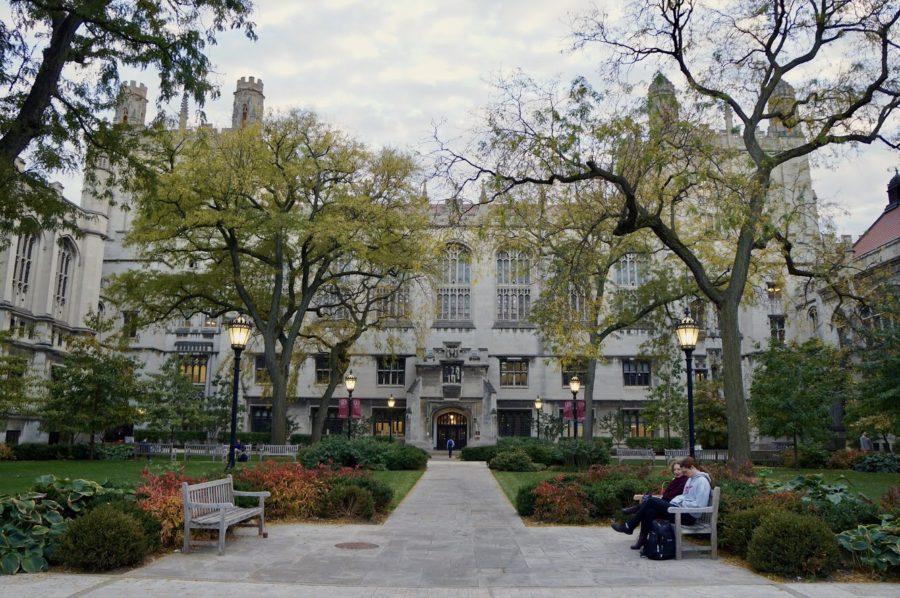Overflowing dorms, embattled fraternities, and fired up grad students: Let us catch you up on some of the campus debates you’re entering.
A record 1,800-plus students enrolled as part of the Class of 2022, exacerbating on-campus housing shortages caused by class-size expansions over the past few years. These shortages prompted the University last year to begin renting units in Vue53—an upscale apartment complex—to house students. The University has not specified whether it deliberately expanded class sizes. It is possible that it has underestimated yield rates at a time when UChicago has maintained a consistent top-five U.S. News & World Report ranking and a sub-10 percent acceptance rate. The University was the first “elite” institution to make standardized tests optional earlier this summer, which may draw more applicants in coming years, causing the acceptance rate to fall.
The grad union: Graduate students work as research assistants, TAs, and instructors while completing their coursework. Since 2007, Graduate Student United (GSU) has been advocating for better pay and benefits for graduate employees. In October 2017, graduate students voted to unionize by an overwhelming margin. Under previous National Labor Relations Board (NLRB) laws, the University would be required to recognize and bargain with the union. However, the Donald Trump administration ushered in new conservative NLRB leadership, and the GSU withdrew its petition to be recognized by the University. This year, GSU will campaign for voluntary recognition from the University and continue to demand better conditions for graduate students.
BusEc: In January, posters plastered in the Reg and Cobb urged the faculty council to vote no on the “business major.” This came as a surprise to many: No one had announced plans to create a business major, or even floated the idea publicly. The Maroon found that the Department of Economics and the Booth School of Business had created a joint proposal behind closed doors to introduce a business economics major to the college. The proposal was meant to be voted on by the College Council—a group of 40 College faculty members—in February. However, after a campus-wide debate over the inclusion of a business major in a liberal arts content, the vote was postponed. Rather than wait for the council to reconvene, the Department of Economics created a business economics track within the existing econ major. To graduate with a specialization in business economics, students must take at least four courses through the Booth School of Business. Booth classes are not required for any other track within the econ major.
Controversial speakers: Dean of Students Jay Ellison sent a letter to the incoming class of 2020 that affirmed the University’s free speech policy: “we do not support so-called ‘trigger warnings,’ we do not cancel speakers because their topics might prove controversial, and we do not condone the creation of intellectual ‘safe spaces.’” The letter garnered national attention: Free speech advocates and conservative groups widely hailed the letter as visionary, and many liberal and student groups spoke out against the statement as callous. Since then, the University free speech debate has been in the forefront of campus politics. Faculty are free to invite whomever they want, and the student body is free to protest. Last year, Booth professor Luigi Zingales reignited the flame when he invited Steve Bannon to participate in a panel on populism. The UChicago Socialists and UChicago Student Action led protests against the event. Ultimately, the Bannon event never came to pass. But the debate over free speech versus hate speech continues.
Two prominent donors failed to fulfill their pledges to UChicago over the past year, costing the University over $100 million. Earlier this year, The Maroon reported that the Pearson brothers, who had pledged $100 million to endow an academic institute for the study of global conflicts, were suing the University for failing to meet the expectations that accompanied the gift. The Pearsons sought to recover the $22.9 million they had already donated to UChicago and indicated that they would not fulfill the rest of their pledge. The Maroon also broke the news a few weeks ago that University trustee Steve Stevanovich was behind on $12 million in pledges due to the continuing legal fallout from his alleged direct involvement in a massive Ponzi scheme. Stevanovich is currently being investigated by the Securities and Exchange Commission (SEC) for potentially committing securities fraud.
UChicago’s fraternities enter the year as embattled as ever, with concerns about sexual misconduct at the forefront. In June, The Maroon reported that there are allegations that at least one Delta Upsilon (DU) brother recently drugged female students and that the chapter had suspended social events. In at least one case, Xanax is the drug that was allegedly used. It’s still unclear if the chapter is facing any sanctions from its national organization, as DU has declined to say if it is investigating. Later in June, The Maroon reported that UChicago had expelled a fourth-year member of Sigma Chi who verbally abused and sexually assaulted a female student. Meanwhile, Phi Delta Theta, which had to go dormant for years after a lawsuit from a pledge who allegedly sustained serious injuries from a hazing incident, is trying to return to campus this fall. It is actively recruiting “Founding Fathers.”
This article is part of The Maroon’s 2018 Orientation Issue, which appears in print during O-Week. You can view all of our Orientation Issue coverage here. If you are interested in joining The Maroon this fall, please find information here.









